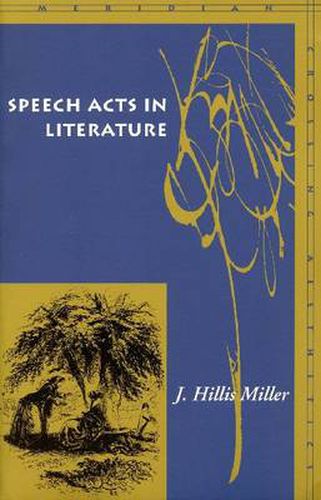Readings Newsletter
Become a Readings Member to make your shopping experience even easier.
Sign in or sign up for free!
You’re not far away from qualifying for FREE standard shipping within Australia
You’ve qualified for FREE standard shipping within Australia
The cart is loading…






This book demonstrates the presence of literature within speech act theory and the utility of speech act theory in reading literary works. Though the founding text of speech act theory, J.L. Austin’s How to Do Things with Words , repeatedly expels literature from the domain of felicitous speech acts, literature is an indispensable presence within Austin’s book. It contains many literary references but also uses as essential tools literary devices of its own: imaginary stories that serve as examples and imaginary dialogues that forestall potential objections. How to Do Things with Words is not the triumphant establishment of a fully elaborated theory of speech acts, but the story of a failure to do that, the story of what Austin calls a bogging down. After an introductory chapter that explores Austin’s book in detail, the two following chapters show how Jacques Derrida and Paul de Man in different ways challenge Austin s speech act theory generally and his expulsion of literature specifically. Derrida shows that literature cannot be expelled from speech acts rather that what he calls iterability means that any speech act may be literature. De Man asserts that speech act theory involves a radical dissociation between the cognitive and positing dimensions of language, what Austin calls language s constative and performative aspects. Both Derrida and de Man elaborate new speech act theories that form the basis of new notions of responsible and effective politico-ethical decision and action.
$9.00 standard shipping within Australia
FREE standard shipping within Australia for orders over $100.00
Express & International shipping calculated at checkout
This book demonstrates the presence of literature within speech act theory and the utility of speech act theory in reading literary works. Though the founding text of speech act theory, J.L. Austin’s How to Do Things with Words , repeatedly expels literature from the domain of felicitous speech acts, literature is an indispensable presence within Austin’s book. It contains many literary references but also uses as essential tools literary devices of its own: imaginary stories that serve as examples and imaginary dialogues that forestall potential objections. How to Do Things with Words is not the triumphant establishment of a fully elaborated theory of speech acts, but the story of a failure to do that, the story of what Austin calls a bogging down. After an introductory chapter that explores Austin’s book in detail, the two following chapters show how Jacques Derrida and Paul de Man in different ways challenge Austin s speech act theory generally and his expulsion of literature specifically. Derrida shows that literature cannot be expelled from speech acts rather that what he calls iterability means that any speech act may be literature. De Man asserts that speech act theory involves a radical dissociation between the cognitive and positing dimensions of language, what Austin calls language s constative and performative aspects. Both Derrida and de Man elaborate new speech act theories that form the basis of new notions of responsible and effective politico-ethical decision and action.